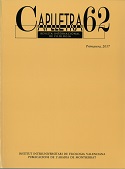Catalan psychological verbs: the case of «agradar» and «interessar»
DOI:
https://doi.org/10.7203/caplletra.62.9569Keywords:
accusative, agent, Catalan, dative, experiencer, patient, proto-agent, psychological verb, stimulus, to interest, to like Abstract
Abstract
Abstract: The experiencer’s semantic features, a lively entity conceivable as a proto-agent, allow its syntactic and semantic primacy in most of sentences with Catalan psychological verbs, and explain the flexibility of these predicates to adapt to conceptual schemes of speakers. The experiencer only loses this primacy when it has to «compete» with a prototypical agent in the sentence, an agentive construction consistent with an experiencer with accusative case. The mechanisms of semantic and syntactic pre-eminence in a sentence give reason for the regularly dative case of the Catalans verbs interessar ‘to interest’ and agradar ‘to like’, as well as for the specific contexts in which these verbs can occur in accusative, although in a more enforced way with verb agradar.
Key words: accusative, agent, Catalan, dative, experiencer, patient, proto-agent, psychological verb, stimulus, to interest, to like.
 Downloads
Downloads
Downloads
Published
How to Cite
-
Abstract773
-
PDF (Català)574
Issue
Section
License
Authors submitting work to Caplletra for publication must be the legitimate holder of the usage rights. Legitimacy for the purposes of publishing the work must also include images, tables, diagrams and any other materials that may complement the text, whether they are the author of such material or not.
Copyright: on publishing their work in the journal, the author grants Caplletra. Revista Internacional de Filologia usage rights (reproduction, distribution and public communication) for both the paper printed version and for the electronic version.
All work published in Caplletra is covered by the Creative Commons license type Attribution-NonCommercial-NoDerivatives 4.0 (CC BY-NC-ND 4.0).
RESPONSABILITY
Caplletra. Revista Internacional de Filologia does not necessarily identify with the points of view expressed in the papers it publishes.
Caplletra. Revista Internacional de Filologia accepts no responsibility whatsoever for any eventual infringement of intellectual property rights on the part of authors.






